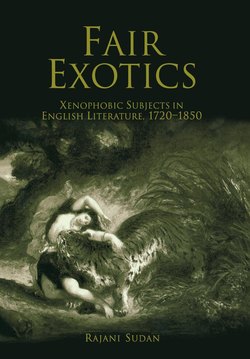Fair Exotics

Реклама. ООО «ЛитРес», ИНН: 7719571260.
Оглавление
Rajani Sudan. Fair Exotics
Отрывок из книги
Fair Exotics
Xenophobic Subjects in
.....
Recent critics have persuasively claimed the influence of imperialism, orientalism, and colonialism on the production of romantic literature after Jerome J. McGann’s important study, The Romantic Ideology, “precipitated a return to historical and political readings of the Romantic period.”20 John Barrell, Marilyn Butler, Nigel Leask, Robert Young, Jerome McGann, Saree Makdisi, Charles Rzepka, Alina Clej, Josephine McDonagh and others address the importance of attending to historical materialism in relation to romanticism, thus shifting our understanding of the discipline as a field without history. Collections such as Tim Fulford’s and Peter J. Kitson’s Romanticism and Empire, Sonia Hofkosh’s and Alan Richardson’s Romanticism, Race, and Imperial Culture, or John Beer’s Questioning Romanticism, among others, conduct very useful cultural inquiry into the concept of romanticism, and problematize the material conditions of romantic discourse. Few arguments, however, have addressed the psychological conditions attendant upon imperialist ideology that make possible the production of romanticism. Little work in romantic studies or in the field of history has addressed the relationship between imperialism and nationalism that together with historical materialism forms the ideological apparatus for cultural representation.21 Leask and Saree Makdisi make important arguments regarding Britain’s sense of national self-enclosure: that imperial cultural incomparability results from internal or domestic anxiety about empire (Leask) or that the move away from trade and commerce and entry into industrialism happened well before the mid eighteenth and nineteenth centuries (Makdisi). I place my own study in relation to these as an investigation of the psychological structures set up to account for these internal anxieties about national identity—for example, Johnson’s trepidations about language or Defoe’s uneasiness with trade—and claim that these concerns are historically based on an economy of xenophobia and xenodochy.
I will argue that British romantic writing, produced from imperialist ideology, is also constituted through the psychological hinge between imperialism and nationalism: xenophobia. The aesthetic focus dominating representations of romanticism (both of the literature and the critical discourse but also of more recent cultural and material readings) have emerged as a result of territorial claims. Not unlike the historical ways in which unknown worlds were incorporated—and introjected—within the parameters and perimeters of a “known” culture, academic definitions of historical periods as intellectual (or historiographical) territories repeat the imperial impulse to nationhood. As early eighteenth-century novels like Robinson Crusoe demonstrate, however, the connections between discourses long believed to have been antithetical to one another may also demonstrate the ways in which we lock certain paradigms of identity into fixed meanings, whether or not we associate them with a specific literary period. It stands to reason, then, that the romantic period is not simply an isolatable historical phenomenon which we have since “passed.”
.....